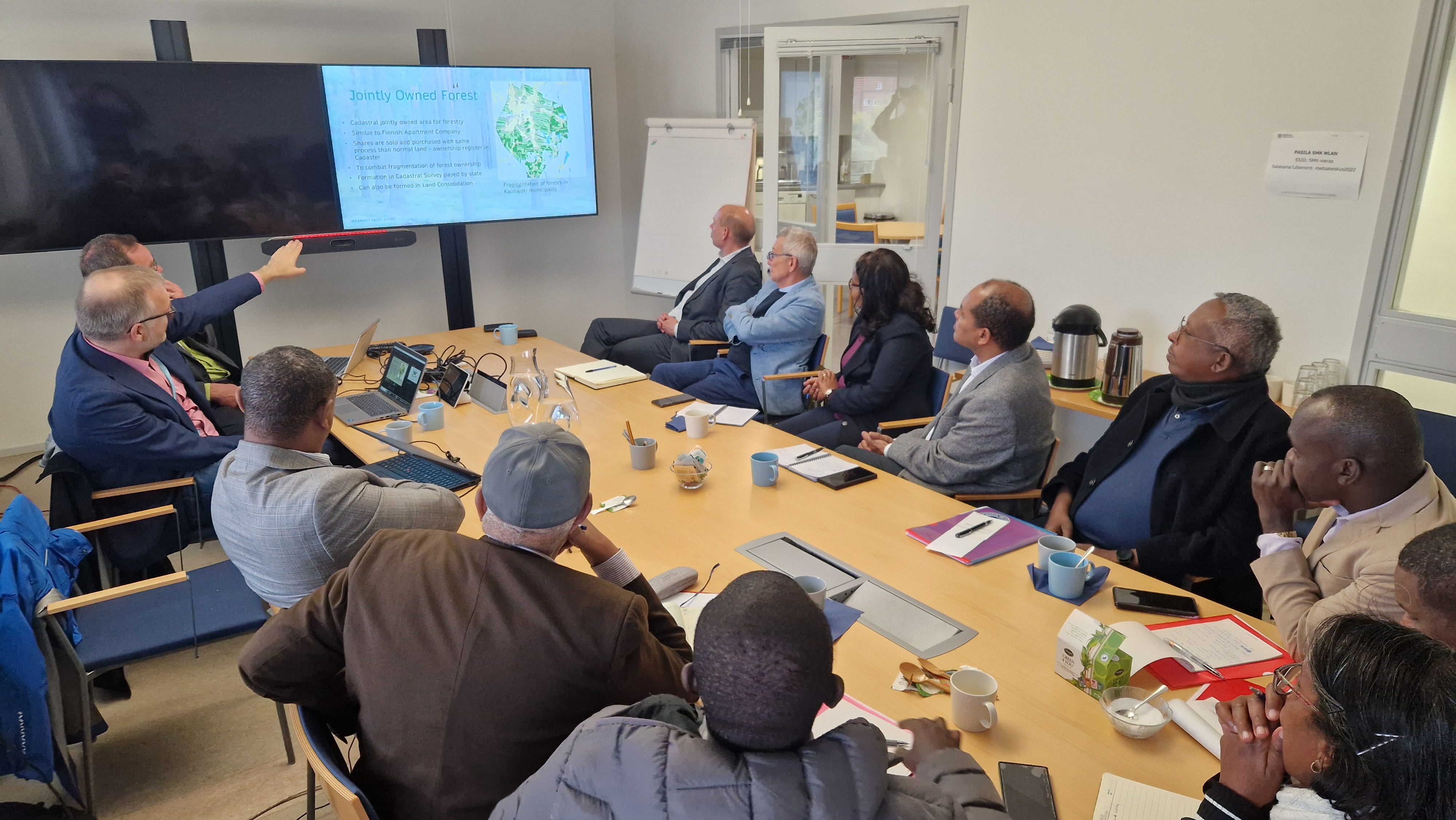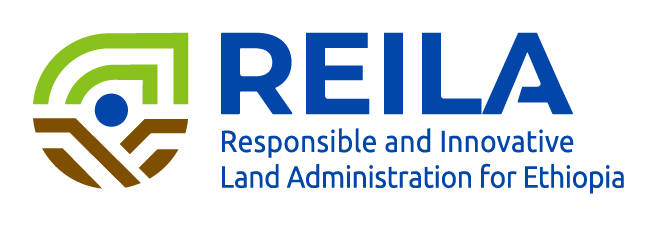Responsible & Innovative Land Administration (REILA)
The Responsible and Innovative Land Administration (REILA) project is a collaborative initiative by the governments of Ethiopia and Finland, launched in 2011. Over two phases, it has revolutionized Ethiopia’s rural land administration, setting the stage for equitable, sustainable, and inclusive land management.
- Land Certification: Introducing cost-effective, scalable methods for land registration and certification, such as Second Level Land Certification (SLLC).
- Digital Transformation: Implementing the National Rural Land Administration Information System (NRLAIS) to digitize land records.
- Capacity Building: Empowering institutions and individuals through technical training, scholarships, and formal education programs.
- Community Engagement: Promoting gender equality and inclusivity in land rights and administration.
For over a decade, the REILA project has been transforming Ethiopia's rural land sector through innovation, collaboration, and digitalization. Our efforts ensure secure land tenure, empower rural communities, and promote sustainable land management practices.
Our Achievements
- Certified over 30 million land parcels.
- Operationalized a national land registry in 450+ districts.
- Supported land governance reforms aligned with international goals, including the UN Sustainable Development Goals.
Our Mission
REILA is committed to improving Ethiopia’s land administration and governance system by ensuring equitable access to land resources, fostering transparency, and empowering communities through innovative land registration and certification systems.
Our Vision
To create a harmonized, technology-driven, and legally sound land administration framework that supports rural transformation, social equity, and economic development in Ethiopia.
Our Impact
- Land Tenure Security: Supporting millions of rural landholders across Ethiopia by facilitating systematic land certification and rural land administration reforms.
- Institutional Strengthening: Providing technical assistance and capacity-building programs for national and regional land administration authorities.
- Digital Innovation: Implementing the National Rural Land Administration Information System (NRLAIS) to modernize Ethiopia’s land registry and enhance transparency.
- Sustainable Land Management: Supporting environmentally responsible land use to combat land degradation and promote climate-resilient agriculture.
- Community Empowerment: Ensuring gender equality and inclusive land rights, particularly for women, youth, and marginalized communities.
How We Work

REILA’s approach is built on innovation, collaboration, and sustainability:
- Technology & Digitalization: Implementing geospatial tools, orthophoto mapping, and digital land registries to improve land administration efficiency.
- Community Participation: Engaging rural communities through awareness campaigns, participatory decision-making, and grievance resolution mechanisms.
- Capacity Building: Providing technical training, policy support, and knowledge-sharing programs for government institutions, academia, and local land administrators.
- Gender & Social Inclusion: Ensuring equal land rights for women, marginalized groups, and internally displaced persons (IDPs).
- Sustainability & Policy Alignment: Aligning with Ethiopia’s national development goals and international frameworks, including the UN Sustainable Development Goals (SDGs).
History of the REILA Projects
REILA I: the Foundations (2011-2016)
The primary goal of REILA I was to develop and pilot innovative methods and systems for rural land certification and administration, setting the groundwork for a modern and harmonized land administration system in Ethiopia.
Key Achievements
Public Awareness Campaigns
- Conducted extensive awareness-raising campaigns in 15 target woredas across the Amhara and Benishangul-Gumuz regions.
- Promoted socially inclusive and equitable land certification processes, ensuring the participation of women and vulnerable groups.
Development of Certification Methods
- Piloted the use of orthophoto technology for land surveys, an innovative method adapted from Rwanda.
- Created a standardized operational manual for systematic rural land registration and certification (Second Level Land Certification - SLLC).
Capacity Building
- Strengthened institutional capacity at federal and regional levels, particularly in the Benishangul-Gumuz and Amhara regions.
- Focused on foundational land administration training and knowledge-sharing to build a skilled workforce.
Strategic Partnerships
- Established collaborations with regional land administration offices and other stakeholders to support project implementation.
Budget
The REILA I projects were implemented with a total budget of 13.9 million euros. Of this:
- The Government of Finland contributed 12.8 million euros in technical assistance and financial support.
- The Government of Ethiopia matched this with 1.1 million euros in cash and in-kind contributions.
REILA II: Scaling and Sustaining Innovations (2017-2024)
Building on the successes of REILA I, the second phase aimed to scale up innovations and ensure sustainable outcomes for Ethiopia’s rural land sector.
Key Achievements
Mass Certification Rollout
- Registered and certified over 30 million rural land parcels across Ethiopia using the SLLC process.
- Expanded the use of orthophoto technology, ensuring accurate and cost-effective land surveying.
Digital Transformation
- Developed and operationalized the National Rural Land Administration Information System (NRLAIS), which digitized rural land records for over 450 woredas.
- Ensured that NRLAIS became the backbone of Ethiopia’s land administration system, providing transparency, accuracy, and efficiency in land record management.
Capacity Enhancement
- Introduced formal training programs in land administration, including the establishment of a Technical and Vocational Education and Training (TVET) program at Assosa College in Benishangul-Gumuz.
- Partnered with Bahir Dar University to offer BSc and MSc programs in land administration.
- o Conducted extensive training for land administrators, surveyors, and community members, producing over 10,000 skilled professionals.
Gender Equality and Social Inclusion
- Implemented gender-responsive strategies, such as co-titling land certificates for spouses and ensuring women’s active participation in land-related decisions.
- Addressed socio-cultural barriers to land access for vulnerable groups, including women, youth, and people with disabilities.
Collaborative Approaches
- Worked closely with international partners such as the World Bank, USAID, and GIZ to harmonize efforts and resources in the land sector.
- Fostered strong government ownership and alignment with national development goals.
Budget
The REILA II projects were implemented with a total budget of 10.5 million euros. Of this:
- The Government of Finland contributed 8.8 million euros in technical assistance and financial support.
- The Government of Ethiopia matched this with 1.7 million euros in cash and in-kind contributions.
Key Implementing Partners
Federal Level
- Ministry of Agriculture (MoA) and the Rural Land Administration and Use Directorate (RLAUD).
- Space Science and Geospatial Institute (SSGI), formerly the Ethiopian Mapping Agency (EMA).
- Ministry of Finance and Economic Cooperation (MoFEC).
Regional Level
- Amhara Regional Bureau of Rural Land Administration and Use (BoRLAU), now Bureau of Land (BoL).
- Benishangul-Gumuz Bureau of Environment, Forestry, and Land Administration (BoEFLA), now Bureau of Land and Cooperatives (BoLCs).
Educational Institutions
- Assosa Agricultural TVET College
- Bahir Dar University.
Consulting Support
- NIRAS Finland served as the lead consulting company, providing technical assistance, project management, and quality assurance.
Legacy and Future Directions
The REILA projects have fundamentally transformed Ethiopia’s rural land sector. They have laid a solid foundation for secure land tenure, equitable land rights, and sustainable rural development.
As REILA II concludes, the focus shifts to a new phase, REILA III, which aims to:
Expand land certification to communal and pastoral areas.
Strengthen the economic utilization of land rights, such as land-based financing.
Continue capacity-building initiatives to support a skilled and adaptive workforce.
Promote innovative solutions to enhance land governance and administration further.
The success of REILA serves as a model for other countries and underscores the importance of collaboration, innovation, and inclusivity in addressing land governance challenges.









